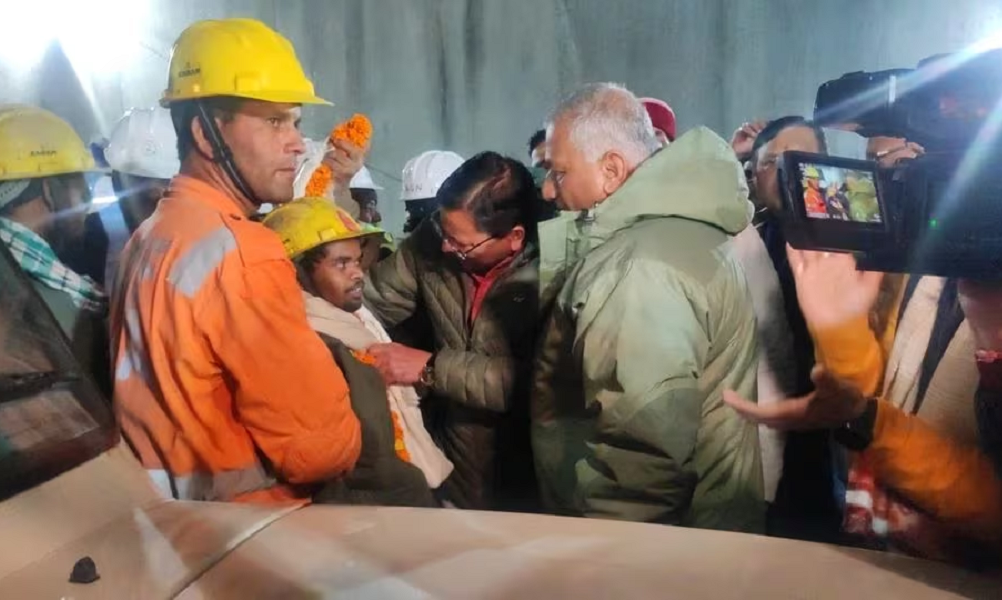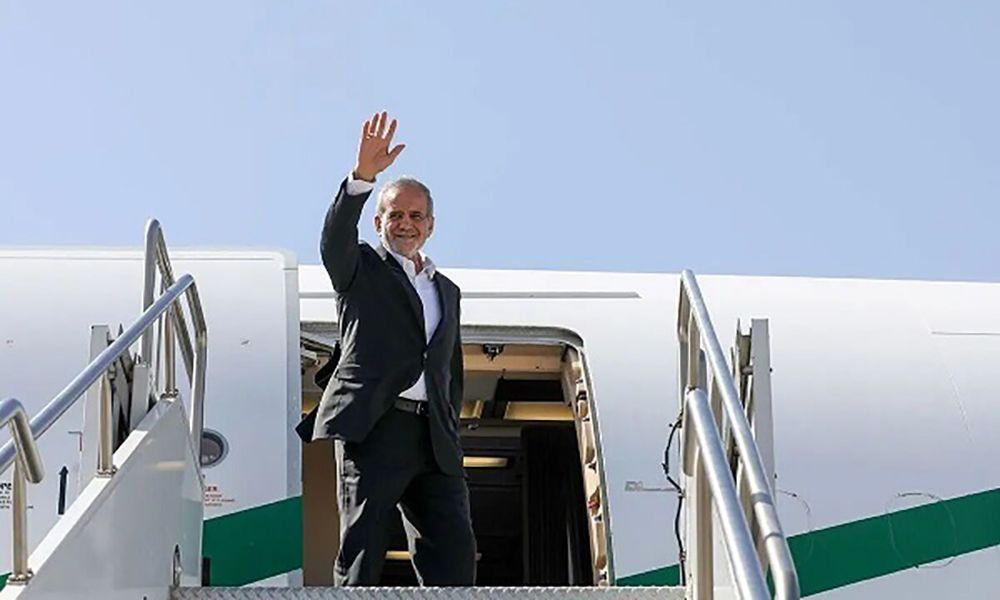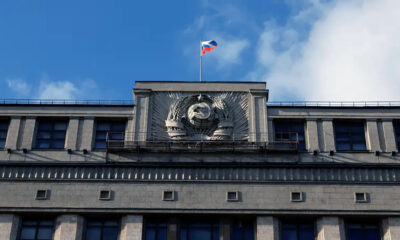Regional
India jubilant as all trapped workers rescued from Himalayan tunnel

Rescuers on Tuesday pulled out all 41 workers trapped for 17 days inside a collapsed tunnel in the Himalayas after drilling through the debris of rock, concrete and earth to reach them, triggering jubilation across India.
The evacuation of the men - low-wage workers from some of India's poorest states - began more than six hours after rescuers broke through the debris in the tunnel in Uttarakhand state, which caved in on Nov. 12, Reuters reported.
They were pulled out on wheeled stretchers through a 90 cm wide steel pipe, with the entire process being completed in about an hour.
"Their condition is first-class and absolutely fine ... just like yours or mine. There is no tension about their health," said Wakil Hassan, a rescue team leader.
The first to be evacuated, a short man wearing a dark grey winter jacket and a yellow hard-hat, was garlanded with marigold flowers and welcomed in traditional Indian style inside the tunnel by state chief minister Pushkar Singh Dhami and federal deputy highways minister V.K. Singh.
Some walked out smiling and were hugged by Dhami, while others made gestures of thanks with clasped hands or sought blessings by touching his feet. All were garlanded and also presented with a white fabric stole by Dhami and Singh.
"I want to say to the friends who were trapped in the tunnel that your courage and patience is inspiring everyone," Prime Minister Narendra Modi posted on social media platform X.
"It is a matter of great satisfaction that after a long wait these friends of ours will now meet their loved ones. The patience and courage that all these families have shown in this challenging time cannot be appreciated enough."
Modi later spoke to the rescued men by phone and enquired about their condition, TV channels reported.
Federal road transport and highways minister Nitin Gadkari thanked rescue workers and said a safety audit of the tunnel would now be done.
Ambulances that had lined up with lights flashing at the mouth of the tunnel transported the workers to a hospital about 30 km away. They are expected to travel to their home states after doctors clear them.
"We are happy and feel relieved. I have told everyone in the family that he has come out," said Rajni Tudu, whose husband Surendra was among the trapped men.
Local residents gathered outside the tunnel set off firecrackers, distributed sweets and shouted slogans hailing Mother India.
The cave-in and the ordeal of the men did not grab much attention in its first week as it happened on the day of the Hindu festival of Diwali and in the run-up to the cricket World Cup semi-finals and finals, which India was expected to win.
It however made national headlines since and there was jubilation around the country on Tuesday, with politicians, retired cricket players, business leaders, diplomats and spiritual leaders hailing the effort.
"The safety of our labourer brothers who are building India is of paramount importance. I salute all the brave men who made this difficult campaign successful," opposition leader Rahul Gandhi posted on X.
Billionaire Anand Mahindra, chairman of conglomerate Mahindra Group, said "after all the sophisticated drilling equipment, it's the humble 'rat-hole miners' who make the vital breakthrough!"
"It's a heartwarming reminder that at the end of the day, heroism is most often a case of individual effort & sacrifice," he posted on X.
The 41 men have been getting food, water, light, oxygen and medicines through a pipe, but efforts to dig a tunnel to rescue them with high-powered drilling machines were frustrated by a series of snags.
Rescue clinched by ‘rat-miners’
Government agencies managing the crisis had on Monday turned to "rat miners" to drill through the rocks and gravel by hand from inside the evacuation pipe pushed through the debris after machinery failed.
The miners are experts at a primitive, hazardous and controversial method used mostly to get at coal deposits through narrow passages, and get their name because they resemble burrowing rats.
The miners, brought from central India, worked through Monday night and finally broke through the estimated 60-metres of rocks, earth and metal on Tuesday afternoon.
"There was probably no government department that was not involved, there was practically an all-of-government approach ... unlike any in the past," said Syed Ata Hasnain, a member of the National Disaster Management Authority which oversaw the rescue.
The tunnel did not have an emergency exit and was built through a geological fault, a member of a panel of experts investigating the disaster has told Reuters.
Regional
Iran’s president to make rare visit to Egypt for D-8 summit
Iran will discuss regional and bilateral affairs with the participating countries on the sidelines of the summit, Baghaei added.

Iranian President Masoud Pezeshkian will take part in a summit of big Muslim countries in Egypt on Thursday, Foreign Ministry spokesperson Esmaeil Baghaei said, the first visit by an Iranian president to Egypt in more than a decade, Reuters reported.
Egypt is hosting the summit of the D-8 Organization for Economic Cooperation, which also includes Bangladesh, Indonesia, Malaysia, Nigeria, Pakistan and Turkey.
Relations between Egypt and Iran have generally been fraught in recent decades but the two countries have stepped up high-level diplomatic contacts since the eruption of the Gaza crisis last year as Egypt tried to play a mediating role, read the report.
Iran's Foreign Minister Abbas Araqchi travelled to Egypt in October to discuss regional issues with Egyptian officials, while his Egyptian counterpart Badr Abdelatty travelled to Tehran earlier in July to attend Pezeshkian's inauguration.
"We have the important summit... known as D-8 in Egypt, the foreign minister will take part in the ministerial conference and then the summit will be held with the participation of the president," Baghaei said in a weekly televised news conference.
Iran will discuss regional and bilateral affairs with the participating countries on the sidelines of the summit, Baghaei added.
The D-8 was established in 1997 to improve cooperation between countries stretching from Southeast Asia to Africa.
Regional
Bomb kills chief of Russian nuclear protection forces in Moscow

A bomb hidden in an electric scooter killed a senior Russian general in charge of nuclear protection forces in Moscow on Tuesday, Russia’s investigative committee said.
Lieutenant General Igor Kirillov, who is chief of Russia’s Nuclear, Biological and Chemical Protection Troops, was killed outside an apartment building on Ryazansky Prospekt, which starts a road some seven km (4 miles) southeast of the Kremlin, Reuters reported.
“Igor Kirillov, the head of the radiation, chemical and biological protection forces of the armed forces of the Russian Federation, and his assistant were killed,” the investigative committee said.
Photographs posted on Russian Telegram channels showed a shattered entrance to a building littered with rubble and two bodies lying in the blood-stained snow.
Reuters footage from the scene showed a police cordon. A criminal case has been opened.
Russia’s radioactive, chemical and biological defense troops, known as RKhBZ, are special forces who operate under conditions of radioactive, chemical and biological contamination.
On Monday, Ukrainian prosecutors charged Kirillov in absentia with the alleged use of banned chemical weapons in Ukraine, the Security Service of Ukraine said, according to the Kyiv Independent.
Russia denies those accusations.
Britain in October sanctioned Kirillov and the nuclear protection forces for using riot control agents and multiple reports of the use of the toxic choking agent chloropicrin on the battlefield.
Regional
Hezbollah chief says group lost its supply route through Syria

Hezbollah head Naim Qassem said on Saturday that the Lebanese armed group had lost its supply route through Syria, in his first comments since the toppling of President Bashar al-Assad nearly a week ago by a sweeping rebel offensive.
Under Assad, Iran-backed Hezbollah used Syria to bring in weapons and other military equipment from Iran, through Iraq and Syria and into Lebanon. But on Dec. 6, anti-Assad fighters seized the border with Iraq and cut off that route, and two days later, rebels captured the capital Damascus.
"Yes, Hezbollah has lost the military supply route through Syria at this stage, but this loss is a detail in the resistance's work," Qassem said in a televised speech on Saturday, without mentioning Assad by name, Reuters reported.
"A new regime could come and this route could return to normal, and we could look for other ways," he added.
Hezbollah started intervening in Syria in 2013 to help Assad fight rebels seeking to topple him at that time. Last week, as rebels approached Damascus, the group sent supervising officers to oversee a withdrawal of its fighters there.
More than 50 years of Assad family rule has now been replaced with a transitional caretaker government put in place by Hayat Tahrir al-Sham, a former al Qaeda affiliate that spearheaded the rebel offensive.
Qassem said Hezbollah "cannot judge these new forces until they stabilise" and "take clear positions", but said he hoped that the Lebanese and Syrian peoples and governments could continue to cooperate.
"We also hope that this new ruling party will consider Israel an enemy and not normalise relations with it. These are the headlines that will affect the nature of the relationship between us and Syria," Qassem said.
Hezbollah and Israel exchanged fire across Lebanon's southern border for nearly a year in hostilities triggered by the Gaza war, before Israel went on the offensive in September, killing most of Hezbollah's top leadership.
-

 Latest News4 days ago
Latest News4 days agoAfghanistan seals T20I series victory over Zimbabwe
-

 World4 days ago
World4 days agoSyrian clerics in former Assad stronghold call for national unity, democracy
-

 Latest News4 days ago
Latest News4 days agoU.S. sentences Afghan man to 30 years in prison for narco-terrorism and witness tampering
-

 International Sports3 days ago
International Sports3 days agoMessi vs Ronaldo: A look at their market values over the years
-

 Latest News4 days ago
Latest News4 days agoInvestment in Afghanistan’s pharmaceutical sector reaches $300 million: Union
-

 Latest News4 days ago
Latest News4 days agoChinese, Tajik officials discuss Afghanistan
-

 Sport4 days ago
Sport4 days agoAfghanistan’s Gulbaddin Naib fined 15% of match fee for dissent
-

 Regional3 days ago
Regional3 days agoHezbollah chief says group lost its supply route through Syria
























